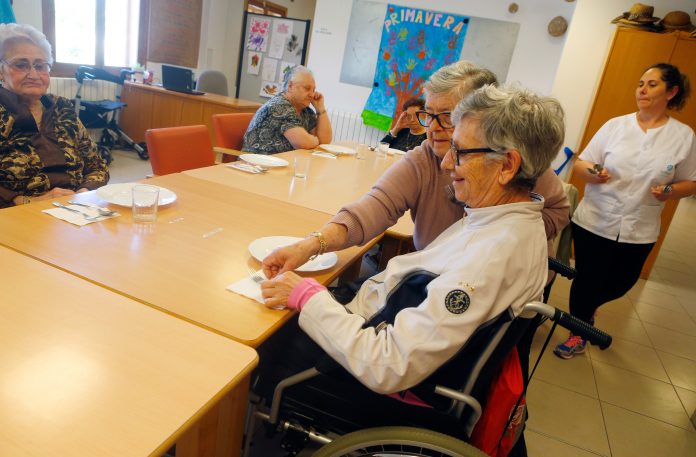Philip Mayling, director of MKG Foods, explores how food can help care home residents suffering from dementia during the third UK lockdown
As the UK enters into its third lockdown, care homes are still ‘widely exposed’ to the virus, and many have already stopped visits once again except for end-of-life circumstances.
This is huge cause for concern, as loneliness and isolation have been a significant problem for elderly care home residents throughout the pandemic, particularly dementia sufferers, many of whom have deteriorated severely during lockdown after being unable to maintain their routines and social activities.
Furthermore, loneliness and isolation are already noted risk factors for both depression and dementia and, according to research, if depression in dementia sufferers remains untreated, the associated memory and cognitive problems worsen(1).
This is proof that now, more than ever, it is crucial that we prioritise the needs and care of elderly dementia sufferers and identify ways to address the chronic loneliness they are experiencing. There are many ways we can do this, and some may be surprised to learn that using food is one of the most effective methods.
Food, comfort, and nostalgia
Most of us have a food [or many foods] that we associate with specific memories from our childhood, from sponge and pink custard served up by the school dinner lady, to our mum’s roast dinner dished up on a Sunday as the ‘Monday dread’ started to set in. Whatever their significance, food-based memories are often vivid and can evoke more emotions than other types of memories.
Food and nostalgia have an intrinsic link, and scientific research shows there is a unique association between our memories and the food we eat. When we eat foods at specific events or occasions, we can create strong connections between that food and our good feelings. These good memories can alter our evaluation of how good a food is and can also powerfully change our mood.
Research has proven that comfort food in particular can reduce our sense of loneliness and feelings of isolation. Quite tellingly, one study showed that you don’t even have to eat the foods to have this experience, and the positive effects of eating comfort food could be mimicked by just smelling the aroma of your favourite food(2).
The effects of eating comfort food are even more astounding when you consider those with dementia, as research in a 2018 issue of the Journal of Alzheimer’s Disease found nostalgia helps enhance psychological resources, for example social connectedness, optimism, self-esteem and positive mood – among people suffering with the disease.
Where dementia patients are concerned, the ability to reminisce with the help of certain foods is extremely powerful. Nostalgia is a psychological resource to help with the management of dementia, as memories of a happier, less confusing time can offer significant comfort to dementia sufferers living in a world full of confusion and conflict.
Food and memory
Our memories are made up of a complex combination of all our senses: sight, taste, smell, sound and touch. Scent in particular plays a powerful role in forming memories and a key part in understanding the loss of it.
There is lots of emerging research around food and memory. One of the most significant findings is that if you keep your memory strong and enjoy positive nostalgic experiences with your food, you can experience many great benefits in your life.
Adding weight to the argument, psychologist and neuroscientist Hadley Bergstrom, believes taste memories are the strongest of associative memories that you can make.
Recognising the positive connection between food, nostalgia, memory and the wellbeing of residents with dementia, care homes across the UK have begun taking part in something called ‘reminiscence therapy’, which is the process of recollecting past experiences or events. It can help provide older people with a sense of fulfilment and comfort as they look back on their lives and is particularly effective therapy for people with dementia, improving their cognition, mood and behaviour and relieving agitation. As food involves scent and taste, it is one of the strongest reminiscence therapy activities.
The role of the foodservice supplier
Foodservice suppliers catering for the care homes industry can play a significant part in helping increase the wellbeing of residents suffering with dementia throughout the current pandemic and beyond.
Many residents in care look forward to the social atmosphere and increased communication that occurs during and around meals. To enhance this, foodservice suppliers can provide specific foods to broaden care homes’ product offerings, such as food moulds which ensure that residents are presented foods that closely resemble what they have come to love and enjoy throughout their lives.
For example, we often assemble pureed roast dinners which are moulded into the shape of roast potatoes, carrots and meat, to help remind residents of the familiar food and meals they know and love.
We can also provide tailored meals for ‘theme days’ such as birthdays, royal weddings and Remembrance Day, all of which further gain clarity with the addition of food.
The coronavirus pandemic has negatively impacted us all in some way, not least elderly care home residents and dementia sufferers who cannot even be afforded the company of those closest to them. Whilst food is just one element of our lives that brings us comfort, its power to evoke positive memories and enhance the lives of those who need it most should not be underestimated.
References
(1) Depression and Incident Alzheimer Disease: The Impact of Disease Severity, 2015
(2) Virginia Commonwealth University, 2015











